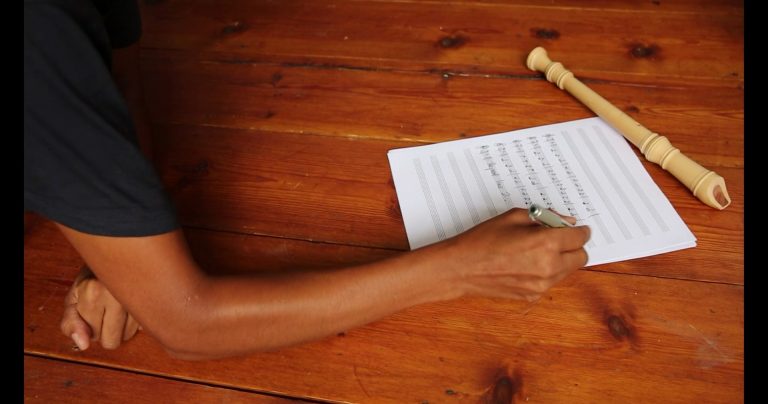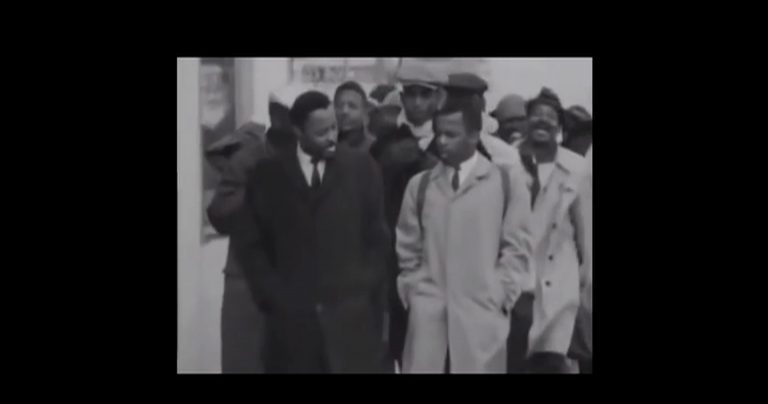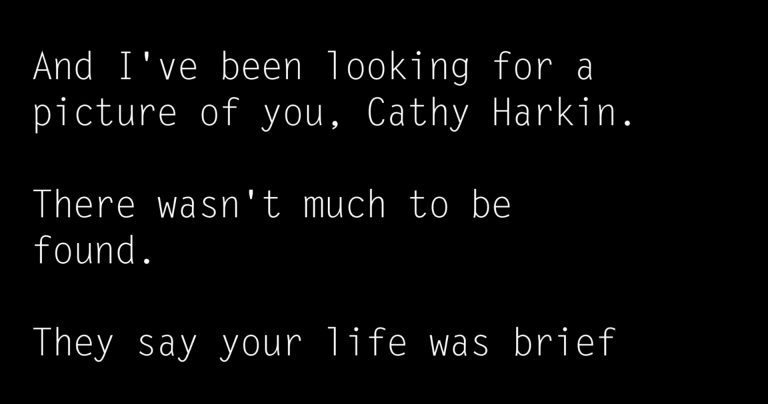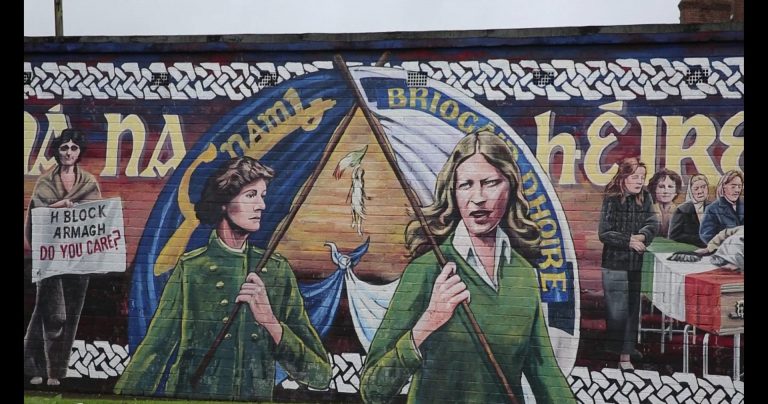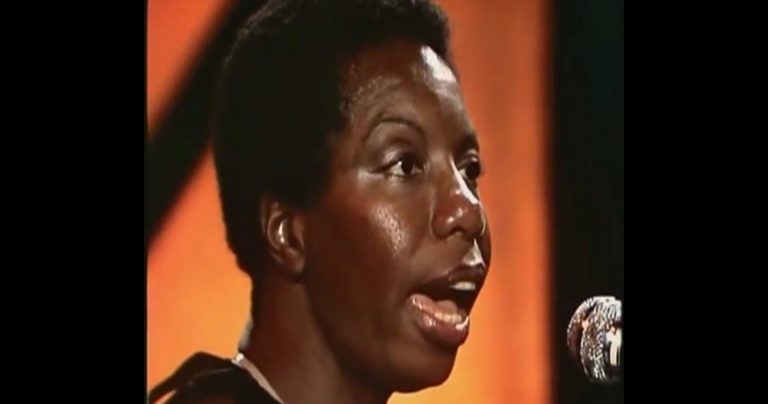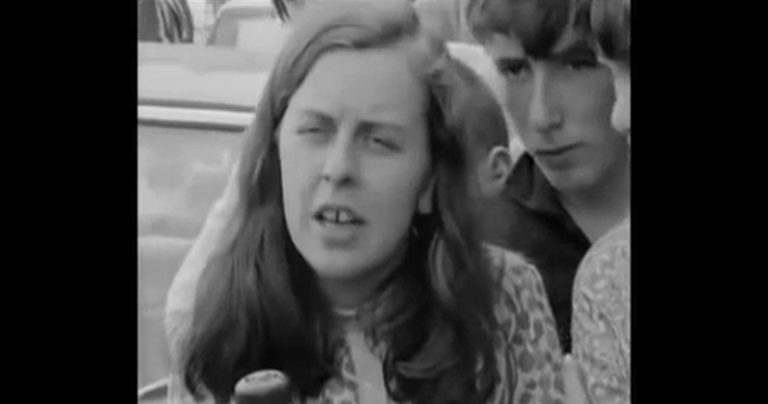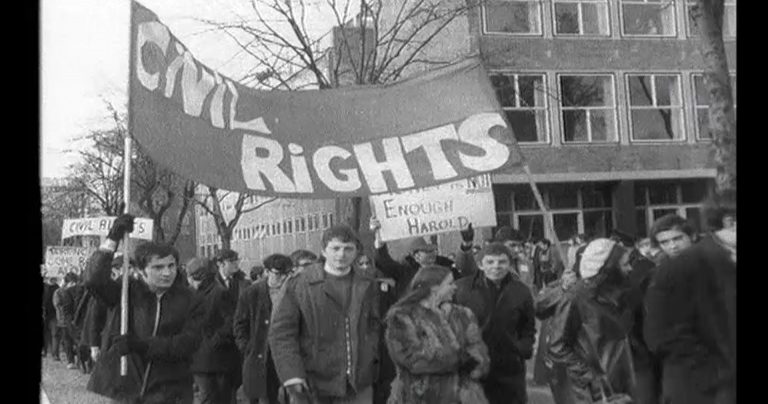IMMA Screen
IMMA Screen is an online screening series showcasing film and video works from the IMMA Collection. New screenings will be available monthly, presenting works by Irish and international artists alongside a new interview and related material from the IMMA Archive.
IMMA Screen is an online screening series showcasing film and videos from the IMMA Collection. New screenings will be available monthly, presenting works by Irish and international artists alongside a new interview and related material from the IMMA Archive. Each work will be accessible online for one month.
Artists’ moving image works have featured extensively in IMMA’s programming history since 1991 and form a key part of the Collection. Recently, many of these works have been digitised from analogue formats such as VHS tape and Laserdisc as part of a large-scale Collection & Programme Digitisation Project funded by the Department of Culture, Heritage & the Gaeltacht. This process preserves the works for the future while also allowing greater access to audiences and researchers. IMMA Screen highlights the Museum’s holdings of moving image work as a significant national collection of artists’ film and video.
Helen Cammock,
The Long Note
We are delighted to present Helen Cammock’s work as the fifth instalment of IMMA Screen. The video was recently acquired for the IMMA Collection following its presentation as part of the Project Spaces exhibition The Long Note in 2019.
In addition to the work, a series of recordings relating to Cammock’s work from the IMMA Audio Archive are available in the ‘Additional Resources’ section on this page. These include a conversation between the artist and Mary Cremin, Director of Void, Derry and a panel discussion titled Women, Politics & Civil Rights Today that was programmed in response to The Long Note exhibition in 2019.
Alongside this, Cammock will take part in a live-streamed panel discussion on the topic of artists working with archive material and moving image, which takes place on 7 October. This event will be the second of a two-part programme organised in collaboration with aemi. Details will be shared through IMMA’s online channels shortly.
About the work:
The Long Note celebrates the involvement of women in the civil rights movement in Derry in 1968. It was commissioned by Void, Derry in 2018 to coincide with the 50th anniversary of the first civil rights march in Derry, Northern Ireland.
Exploring social histories through film, photography, print, text and performances, Helen Cammock creates multiple and layered narratives that are not linear, allowing the cyclical nature of history to be revealed. Through these devices, Cammock explores the motivation for women’s participation in the civil rights movement, the invisibility of women in the historical narrative of the time, and how it impacted family life and the notion of loss. The Long Note is an attempt to articulate the variety of political positions taken by women during the movement; there was no one unifying position or one identity but a multitude of voices that permeated a turbulent time in Derry.
The Long Note is a partial move towards redressing the lack of the female voice within the historical narrative, and a recognition of the need to highlight the centrality of women in what was a pivotal moment in Derry and Ireland’s history.
Cammock’s work has an ability to contextualise events within a universal struggle, addressing geopolitics in all its complexities, giving a voice to the invisible, laying bare the importance of the collective experience and highlighting women’s perspectives within these events. While focused on Derry, the film draws parallels with the US civil rights movement and black liberation struggles there. In an interview with Cammock as part of the film, Bernadette Devlin McAliskey refers to key figures driving the civil rights movement in the US as influential to her understanding of the situation in the North at the time as well as her relationship with feminism.
The complexities of The Long Note resonate with a contemporary sense of an unknown future; history can help question what is currently overshadowed by the political and offer greater insight to the potential social implications. There is no absolute answer but there is a need to be inclusive, to listen and to be heard.
Interview with the Artist
Interview with the Artist
About the Artist
Helen Cammock was born in Staffordshire, UK in 1970. She studied at the University of Brighton, and the Royal College of Art, London.
An interest in histories, authorship, storytelling and the excavation of lost, unheard and buried voices lead Cammock to map her own creative processes on to social and political situations. Cammock’s work draws on material from Nina Simone, Philip Larkin, James Baldwin, The Housemartins, Walter Benjamin, Franz Fanon and others to reveal the way in which we construct our own personal collage of influences and reference points to establish a sense of self, context and history. She works across moving image, photography, writing, poetry, spoken word, song, performance, printmaking and installation.
Cammock was shortlisted for the 2019 Turner Prize and was awarded the prize along with the other three nominees. Recent screenings include the Serpentine Cinema Series and Tate Artists Moving Image Screening Programme. Cammock has exhibited at Cubitt, London; Galerie Futura Alpha Nova, Berlin; The Tetley, Leeds; Open Source Contemporary Arts Festival; Hollybush Gardens, London; 198 Contemporary Arts and Learning, London; and Void, Derry, Northern Ireland. Her written work has been published in several journals and magazines. Cammock is currently working on a project with Serpentine Galleries; Novel, Reading International and a new commission with Film and Video Umbrella, Touchstones Gallery and The Photographers Gallery. In 2018 Cammock was awarded the Max Mara Prize for Women which includes a forthcoming exhibition at Whitechapel Gallery, London and Maramotti Collection, Italy.
Additional Information
Additional Information
The first programme for IMMA Screen presents works by six artists over six months. Including Helen Cammock, Phil Collins, Vivienne Dick, Kevin Gaffney, Isabel Nolan and Alanna O’Kelly.
In different ways, these works engage with performance and the role of the camera in the construction and mediation of identity. From Isabel Nolan’s humorous explorations of performed identity in Sloganeering 1-4 (2001), to Phil Collins’ confronting insight into the depiction of war victims by journalists in How to Make a Refugee (2000). In thinking about the psychological implications of newly imposed physical distancing between ourselves and others, the programme invites a timely reflection on the power and politics of representation and the continuous fabrications of the self and the other. A number of these works, including Sanctuary/Wastelands (1994) by Alanna O’Kelly, also deal poignantly with ideas of loss and erasure.
